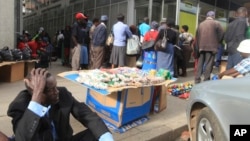The International Monetary Fund (IMF) says Zimbabwe may plunge into a humanitarian crisis due to missed economic targets and this can only be averted if the international community provides the much-needed donor support.
In a statement Wednesday following the conclusion of its latest Article IV consultation in the southern African nation, the IMF said Wednesday the macroeconomic stability remains a challenge: the economy contracted sharply in 2019, “amplified by climate shocks that have crippled agriculture and electricity generation; the newly introduced ZWL$ has lost most of its value; inflation is very high; and international reserves are very low.”
It said the climate shocks have magnified the “social impacts of the fiscal retrenchment, leaving more than half of the population food insecure. With another poor harvest expected, growth in 2020 is projected at near zero, with food shortages continuing.”
It noted that the government that came to office following the 2018 elections adopted an agenda focused on macro stabilization and reforms.
“This was supported by a Staff Monitored Program from the IMF, adopted in May 2019, but is now off-track as policy implementation has been mixed. Notable reforms include a significant fiscal consolidation that has helped reduce the monetary financing of the deficit, the introduction of the new domestic currency in February 2019, the creation of an interbank FX (forex) market, and the restructuring of the command agriculture financing model to a public-private partnership with commercial banks.
“However, uneven implementation of reforms, notably delays and missteps in FX and monetary reforms, have failed to restore confidence in the new currency.”
Reengagement with the international community continues to face delays, said the IMF, adding that the Zimbabwean government has yet to define the modalities and financing to clear arrears to the World Bank and other multilateral institutions, and to undertake reforms that would facilitate resolution of arrears with bilateral creditors.
“This continues to constrain Zimbabwe’s access to external official support. As a result, the authorities face a difficult balance of pursuing tight monetary policy to reduce very high inflation and prudent fiscal policy to address the macroeconomic imbalances and build confidence in the currency, while averting a crisis.”
The IMF said while the 2020 budget includes a significant increase in social spending, it is likely insufficient to meet the pressing social needs. “Absent a scaling up of donor support, the risks of a deep humanitarian crisis are high.”
Executive Board Assessment
Executive directors noted with concern that Zimbabwe is facing an economic and humanitarian crisis exacerbated by policy missteps and climate‑related shocks.
“These would require difficult policy choices from the authorities and support from the international community."
The IMF urged Zimbabwean authorities to make a concerted effort to ensure economic and social stability through the adoption of coordinated fiscal, monetary and foreign exchange policies, alongside with efforts to address food insecurity and serious governance challenges.
They emphasized the importance of reengagement with the international community to support efforts to achieve economic sustainability and address the humanitarian crisis.
Notwithstanding efforts in 2019 to tighten the fiscal stance and contain quasi‑fiscal operations by the central bank, the IMF said, pervasive deficits remain and could be exacerbated by the need to respond to the humanitarian crisis.
“Directors called for non‑essential spending cuts, including decisive reforms to agricultural support programs, to allow for social spending needs. They underscored the importance of public financial management and enhanced domestic revenue mobilization efforts.”
They stressed that eliminating deficit monetization would not only be crucial for fiscal sustainability, but it is also expected serve as a precondition for the stabilization of hyper‑inflation and the preservation of the external value of the currency.
The IMF noted that Zimbabwe remains in debt distress, with large external arrears to official creditors, and encouraged the authorities to give impetus to reengagement efforts and debt management and transparency.
“In particular, they cautioned against continued recourse to collateralized external borrowing on commercial terms as this may potentially complicate any future arrears clearance operation.”
The IMF underscored the need to establish credibility in the new currency. It encouraged the authorities to press forward with the establishment of a functional foreign exchange market and to remove distortions that could lead to rent‑seeking behavior in the economy.
The IMF further noted that given low reserves and hyper‑inflation, limited credibility, and a lack of access to traditional forms of external financing, a monetary targeting regime is appropriate to conduct monetary policy.
“Enhancing central bank independence and transparency, including by timely publication of monetary statistics, would be important.”
It welcomed the progress on financial innovation, supervision and inclusiveness indicators.
However, it said there is need for continued vigilance to ensure financial stability.




